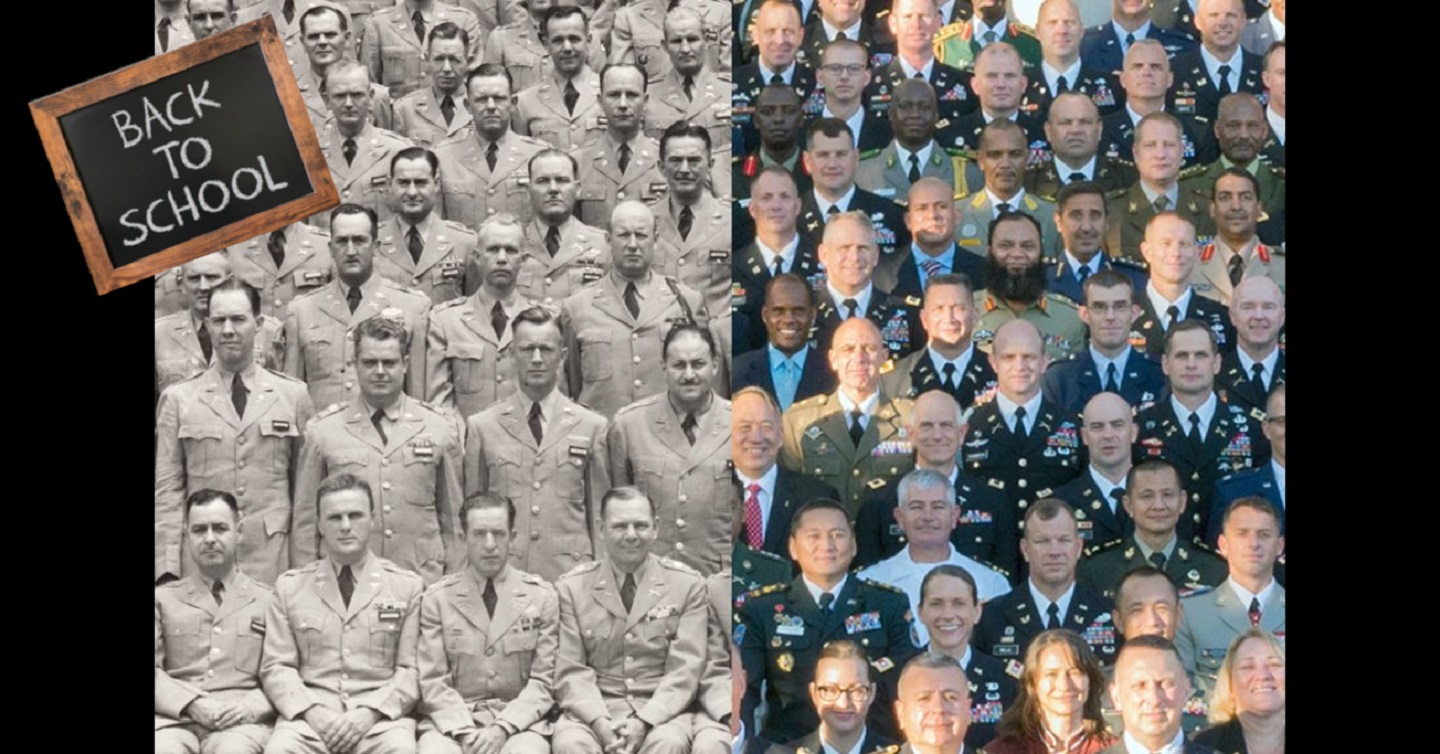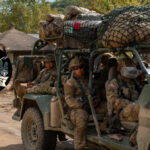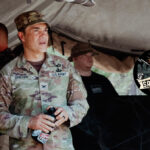
Yesterday began the first full week of instruction for the resident course at the U.S. Army War College. Introductions are done, orientation is over and another year of Boatyard Wars is in the books. Now students will begin to flex intellectual muscles that they may not have stretched for a few years. The editorial team thought we could help get things rolling with the strategic re-release of a few articles and podcast episodes that highlight the Carlisle Experience, the reasons War Colleges exist, useful tools for thinking, and additional programs available throughout the year.
In this War Room Podcast re-release, “Why War Colleges?” Andrew A. Hill interviews the 50th Commandant of the U.S. Army College, U.S. Army Major General Bill Rapp to discuss the history, roles, and responsibilities of war colleges to develop future strategic leaders, both military and civilian, and to develop ideas that address current and future needs of the defense enterprise. They explore why the Army’s performance during the Spanish-American War necessitated the Army War College’s founding, and how it has evolved in the century since.
We can fight well and still not win wars.
Podcast: Download
Andrew Hill is the former Chair of Strategic Leadership and the first Editor-In-Chief of WAR ROOM at the U.S. Army War College.
Photo Description: Left — Close-up of U.S. Army War College resident class of 1952. Right — Close-up of U.S. Army War College resident class of 2017.
Photo credit: U.S. Army War College





From our podcast above: MG (ret.) Bill Rapp speaking:
“We can fight well and still not win wars.”
Question: Are U.S. Army War College attendees introduced to what a “win” might look like? For example, as described below:
The following three excerpts are from the “Charter of Paris for a New Europe” — which appears to be the Old Cold War “surrender document”/the “peace treaty” that the Soviets signed in November 1990:
“We undertake to build, consolidate and strengthen democracy as the only system of government of our nations.” (See Page 3.)
“Human rights and fundamental freedoms are the birthright of all human beings, are inalienable and are guaranteed by law. Their protection and promotion is the first responsibility of government. Respect for them is an essential safeguard against an overmighty State. Their observance and full exercise are the foundation of freedom, justice and peace.” (Also see Page 3.)
“Freedom and political pluralism are necessary elements in our common objective of developing market economies towards sustainable economic growth, prosperity, social justice, expanding employment and efficient use of economic resources.” (See Page 4.)
Follow-on question:
Now, 30-plus years after the end of the Old Cold War — and re: both here at home in the U.S./the West and there abroad elsewhere in places such as Russia — how much of the above still hold sway?
“War colleges,” it would seem, are exceptional necessary; this, for example, to discuss — and to determine what to do about — the (related?) national security matters that I present below:
1. The Type and Cause of Conflict Today: Today we must recognize that the U.S./the West is involved in three conflicts, all of which, in certain ways, seem are similar to one another. These such conflicts, and this such similarity, being as follows:
a. A so-called “war on terror” — with certain non-state and state actors — wherein, those who do not wish to be transformed more along ultra-modern western political, economic, social and/or value lines (they rightfully feel threatened by same?) use aspects of their history, culture and/or values as “weapons of war” in this such conflict.
b. A so-called “great power conflict” — with larger states and societies — wherein, those who do not wish to be transformed more along ultra-modern western political, economic, social and/or value lines (they rightfully feel threatened by same?) use aspects of their history, culture and/or values as “weapons of war” in this such conflict. And
c. A growing “civil war” — within the U.S. and certain other western states and societies themselves — wherein, those who do not wish to be transformed more along ultra-modern western political, economic, social and/or value lines (they rightfully feel threatened by same?) use aspects of their history, culture and/or values as “weapons of war” in this such conflict.
(Given the scope and scale of these such conflicts — and their commonality and worldwide both here at home and there abroad aspect — what is the likelihood that we can “win” in any or all of these such conflicts?)
2. Deterrence, in These Such Circumstances, Has Great Difficulty: We should note that — as per such things “deterrence” today — the Islamists would not seem to be “deterred” by our DoD (or by the U.S./the West’s other instruments of power and persuasion) today, this, from fighting back against unwanted political, economic, social and/or value transformations; likewise the North Koreans would not seem to be “deterred” by our DoD, etc., today, this, from fighting back against these such unwanted transformations; also the Iranians would not seem to be “deterred” by our DoD, etc., today, this, from fighting back against these such unwanted transformations; likewise the Russians and the Chinese would seem to be “deterred” by or DoD, etc., today, this, from fighting back against such unwanted transformations; and even people here in the U.S./the West would not seem to be “deterred” by our DoD, etc., today, this, from fighting back against the political, economic, social and/or value changes/transformations that the U.S./the West has sought to achieve post-the Old Cold War.
3. Why Civil-Military Relations, Civil-Government Relations and Nation-to-Nation Relations Have Changed Post-the Old Cold War: As relates to the post-Cold War change in civil-military relations, etc., can this not be best understood from the following perspective:
a. During the Old Cold War, when the PREVENTION of revolutionary political, economic, social and/or value change (of the Soviet/the communist type back then) was our order of the day/was the political objective of the U.S./the West, the natural enemies of revolutionary change, to wit: the more conservative elements of the states and societies of the world, these folks played an important role in “holding down the fort” back then.
b. However, after the Old Cold War, when the ACHIEVEMENT of revolutionary political, economic, social and/or value change (so as to better provide for such things as capitalism, markets and trade, and national security via same) became the order of the day/became the political objective of the U.S./the West, the natural enemies of revolutionary change — to wit: these self-same conservatives of every country in the world — these folks now came to be seen as standing directly in the way of necessary (for national prosperity and security purposes) progress.
c. Thus, In 180 degree “about face” circumstances that I describe at my items “a” and “b” immediately above, how could anyone expect that the “transforming” nation’s civil-military relations, their civil-government relations, etc., would not — likewise and accordingly — change? (From a civil-military and a civil-government relations point of view, for example, many of the civil populations of the world’s conservatives, in circumstances such as these, cannot help but see their militaries, and their governments, as agents of such unwanted and threatening change, as examples of such unwanted and threatening change, and as potential and/or real enforces of such unwanted change?)
Herein, the contemporary discussion of the three (related?) national security matters like those that I present above, this, alone, would seem to answer the question “why war colleges?”
As to my answer above — re: the question “why war colleges” — as to that such question and answer, an explanation may prove useful; this, to help explain the amazing (and amazingly related?) “conflicts” found at my items 1, 2 and 3 above. As to such an explanation, let me start with the following item, which is to be found at the Mar-Apr 2017 edition of “Foreign Affairs,” and, therein, in the article by Walter Russell Mead entitled “The Jacksonian Revolt: American Populism and the Liberal Order:”
“In this new world disorder, the power of identity politics can no longer be denied. Western elites believed that in the twenty-first century, cosmopolitanism and globalism would triumph over atavism and tribal loyalties. They failed to understand the deep roots of identity politics in the human psyche and the necessity for those roots to find political expression in both foreign and domestic policy arenas. And they failed to understand that the very forces of economic and social development that cosmopolitanism and globalization fostered would generate turbulence and eventually resistance, as ‘Gemeinschaft’ (community) fought back against the onrushing ‘Gesellschaft’ (market society), in the classic terms sociologists favored a century ago.”
Next let me suggest that — with regard to the above — post-the Old Cold War, the U.S./the West came to believe that, now and in the near future, (a) conflict would occur, most significantly, on the “economic competition” battlefield, that, accordingly; (b) “victory” would need to be pursued and achieved, this, by “winning” in “economic competition” terms and that, therefore of necessity, (c) the U.S./the West would need to prioritize the wants, needs and desires of Gesellschaft (market society), these, over the wants, needs and desires of Gemeinschaft (community). As to that such explanation and suggestion, see the following:
“Proponents of this vision of a globalized economy characterize the United States as ‘a giant corporation locked in a fierce competitive struggle with other nations for economic survival,’ so that ‘the central task of the federal government’ is ‘to increase the international competitiveness of the American economy.” (See near the end of the only full paragraph on Page 643 of the 2015 Catholic University of America, Columbus School of Law paper entitled “Moral Communities or a Market State: The Supreme Court’s Vision of the Police Power in the Age of Globalization,” by Antonio F. Perez and Robert J. Delahunty.)
Conclusion:
Thus, post-the Old Cold War, when the U.S./the West (for national security reasons) came to prioritize the wants, need and desires of Gesellschaft (market society); these, over the wants, needs and desires of Gemeinschaft (community), this set the stage for:
a. The (related?) conflicts found at my items 1, 2 and 3 in my comment immediately above and for:
b. Individuals, groups and nations — found both here at home and there abroad — to gain power, influence and control; this, by stating that they would be the defenders/the champions/the protectors of Gemeinschaft (community) — and their wants, needs and desires — which were all under assault now by those who had come to prioritize the wants, needs and desires of Gesellschaft (market society).
(War college professors, attendees, etc., thus, needing to “get after this”/needing to incorporate these exact such matters into their teaching, learning, discussions, etc.?)